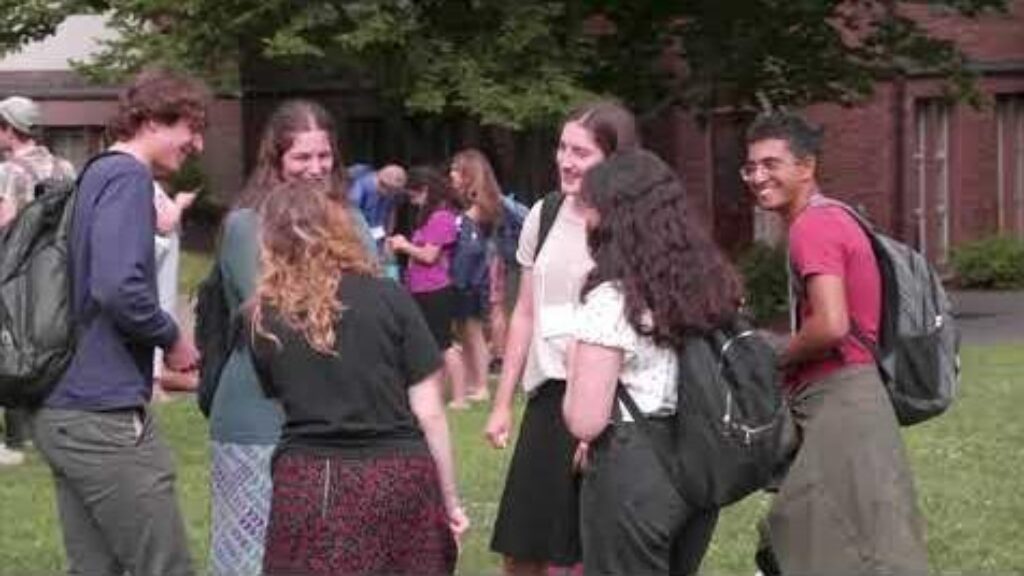Fewer but More Extraordinary Jews
BY OCEAN TIMMINS
In 1996, the Jewish intellectual Milton Himmelfarb predicted that the future of American Jewry would look like “fewer but better Jews.” When I first read this line, I made the common assumption that by “better,” he meant “observant.” However, if you read the text in which Himmelfarb says this closely, it is very vague. He makes this bold, even confusing statement in a symposium response not too dissimilar from the one here. A list of questions was posed to 47 Jewish American thinkers and intellectuals, and among them was: “Do you see any prospect of a large-scale revival of Judaism in America?”
This is the question that Himmelfarb was answering when he referenced the movie Ninotchka, in which the main character, whom the movie is named for, justifies Stalin’s mass killings by saying, “Therrre will be fewerrr but betterrr Rrrussians.” While a dark quotation, it illustrates Himmelfarb’s point in a powerful way. Ninotchka implies that Russia would be better off without the undesirables among its population, just as many believe Jews would be better off without those who have assimilated out of the community.
At first glance, I took issue with the word “better” in the context of Jews.
I found it hard to make a value judgment on people when it is impossible
to quantify such value, in contrast to the quantitative measure of “fewer.” Some questions that ran through my head include: How can you say one Jew is better than another? Is it in terms of halakhic observance? There is a lot more to Judaism than the laws. Is it based on community engagement? What about those without an engageable community? Is it based on education? Not everyone has access to a Jewish education and not everyone has the ability to take advantage of it even if they do. Could it be a combination of these things?
Then, after thinking about it a little more, I realized that Himmelfarb was not referring to individuals when he said “better.” Rather, he was referring to a group: the fewer Jews that were left. I was still left unsatisfied, as I do not like the idea of the Jewish people being “better” without a portion of the current population. Then I thought to myself, are the “fewer but better Jews” fewer because they are better? Or are they better because they are fewer? At this point I realized, all of the issues I have with Himmelfarb’s statement come from the word “better,” so I set out to find an alternative.
It took me a long time to find a suitable replacement that keeps the sentiment but eases my qualms. It took a rereading of Himmelfarb’s original symposium response to find the right word. Earlier in the piece, while discussing whether Jews are the chosen people, he posits, “Maybe we would feel more comfortable if, instead of talking about Election and Mystery, we talked about less lofty extraordinariness.” Extraordinariness. The future of American Jewry very well may be fewer but more extraordinary Jews. Now what does more extraordinary entail? I believe that the more extraordinary Jew values the Jewish people, Jewish culture, Jewish identity, and Jewish practice.
Nevertheless, looking back, thankfully, I believe Himmelfarb was wrong. The American Jewish population is increasing, albeit slowly, and the majority
are connected to their Judaism in one way or another. In 1996, there were an estimated 5.9 million Jews in the United States. Today there are an estimated 7.6 million. That is a 28% increase over 27 years, though it is only marginally more than the increase in the total American population (about 23%) over that same time period.
One cause for concern is that in 1996, the rate of intermarriage was 37%, and in 2020, it was recorded at 61%. However, almost 80% of Jews that intermarry are “Jews of no religion,” and many are considered Jewish in census data only. On the contrary, most Jews who hold some form of connection to Judaism, whether it be going to synagogue, engaging with the community, or even just celebrating holidays with family, are continuing to marry other Jews and furthering Jewish continuity. People discuss intermarriage as the downfall of Judaism, but the sad reality is that most of the people that do not marry other Jews and do not raise Jewish children lack any Judaism to pass on in the first place.
Looking ahead, there is a fear that the numbers will catch up with us. All of the Jews in name only will eventually stop showing up on the census, ADL reports, and the Pew Research Center study because of intermarriage. Thus, a significant portion of the population will fall away, causing numbers to decrease. I am afraid that by the time I am an adult, the number of American Jews will start to dwindle as trends that have been boiling under the surface for a while start to show up on paper.
I believe Milton Himmelfarb’s prediction has not yet come to pass, as the number of Jews in America is growing according to every major poll. However, I, like Himmelfarb, do not see the prospect of a large-scale revival of Judaism in America in the near future. Rather, I see the possibility of a contraction
in the Jewish population overall, but alongside this contraction, the Jews
that will remain are the “extraordinary,” leaving us with fewer but more extraordinary Jews.
Mr. Ocean Timmins is a homeschooled rising senior. He resides in Brooklyn, New York.
Suggested Reading

A New Viewpoint on Diversity
Often, it seems that the people who talk about diversity never visit diverse communities. People seem to think that diversity is based on how one looks. True diversity is not about how someone looks, but how they act.

My Real Internal Conflict is Not One of Clashing Interests
When do my Jewish interests and American interests conflict? After much careful internal deliberation, I have concluded that they do not.

Regaining our Power Through Knowledge: The Solution to Rising Anti-Semitism on Campus
An emotional connection to our Judaism cannot be our only solace. Knowledge is the solution to the problem Jewish students face today.

Between Separating Ourselves and Seeing Ourselves in Others
BY YAEL BURGESS EISENBERG When a gentile came before Hillel and said he would convert to Judaism if Hillel could teach him the entire Torah while standing on one foot,…